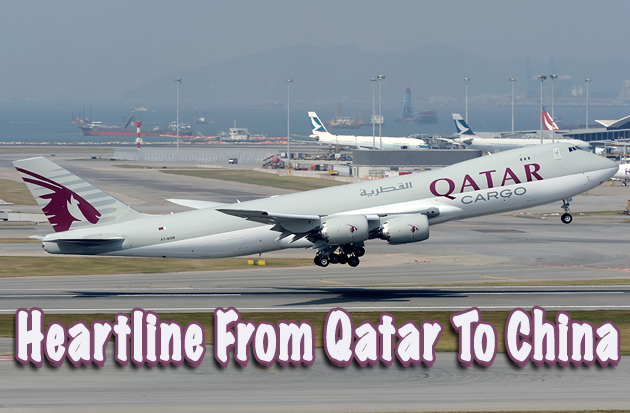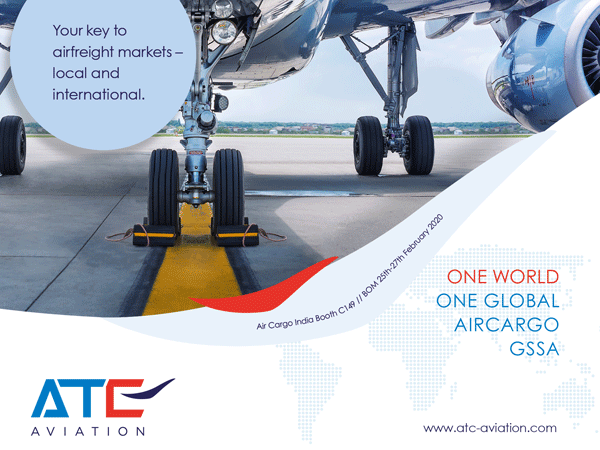
As the world moves to thwart the COVID-19 pandemic from spreading,
last week in Mumbai Buddhist monks held candles and prayed for people
affected by the deadly virus. |
Air Cargo India takes off in Mumbai
this week as COVID-19 rages in China.
So here are some words of advice for all
conferees:
From the moment that you take off from
home, stop greeting people by shaking hands, hugging, and kissing.
With COVID-19 on everybody’s mind
extend greetings and really show the love the traditional Indian way:
with hands together at chest level forming a pyramid as you smile and
say “Namaste” which means “I bow to you.”
Such is life in the year 2020 as air cargo
begins its long year of trade shows and events.
COVID-19 may have dampened air freight growth across the world, but a
sold-out Air Cargo India being held in Mumbai this week, February 25-27,
2020, offers a networking and educational event so that all might get
a better handle of exactly where air cargo is heading in 2020.
In a time of fear and misinformation, some
folks who are attending Air Cargo India spoke up in advance.
For Kale More Has More
An upbeat Amar More, Director, Kale Logistics
Solutions, put it rather aptly:
“In spite of COVID-19, we find the
buzz about Air Cargo India unabated, as we plan to meet a lot of our customers
and prospects during the event.”
He added that “most visitors to ACI
that we have spoken to are continuing with their plans to travel to Mumbai.”
For Kale More Is More
 Kale’s
More is looking ahead to a packed schedule at Air Cargo India. Kale’s
More is looking ahead to a packed schedule at Air Cargo India.
“We are excited to meet our friends,
colleagues, Kale customer family, media, and, of course, our fellow board
and trustee members of TIACA.”
More’s enthusiasm comes from the fact
that Kale will be showcasing its United Nations award-winning Air Cargo
Community system and its air cargo handling system (which is automating
cargo handling at 80+ airports globally).
It’s also fair to say that with more
than 80 percent of India’s air cargo traffic moving via Kale’s
system, attending Air Cargo India is a no-brainer.
No Ticket No Visa No Show For Chinese
Sadly, there will be no participation or
visitors from China following the Indian government’s temporary
cancellation of all e-visas to Chinese passport holders and shut down
of transportation services.
“Due to the current circumstances,
we have no exhibitors or delegates from mainland China” was the
statement from the show organizers.
But Air Cargo India will include “participation
from 15 countries including the USA, UK, Germany, France, Canada, Belgium,
Kuwait, Turkey, and the UAE.”
Doctors On Call 24/7
Additionally, the organizers have taken
precautionary measures for all exhibitors and visitors by ensuring the
presence of doctors and a clinic; a 24-hour ambulance during set up of
stalls and on the show days; hygienic cleaning services; constant water
supply; and adequate supply of face masks and hand sanitizers.
Gathering At Crucial Time
 Sunil
Arora, newly elected President of Air Cargo Agents Association of India
(ACAAI) put it this way: Sunil
Arora, newly elected President of Air Cargo Agents Association of India
(ACAAI) put it this way:
“ACI has always been an industry show
where carriers and cargo terminal operators come together and showcase
their vision and plans based on the trends of world cargo.”
Putting aside the coronavirus scare for
a moment, he said that “this year ACI will have more enthusiastic
participation as it has come at a very crucial time with the world under
the epidemic cloud of coronavirus.
“China has been a top spot with freight
movement across the world, be it air or sea.
“We need to estimate and plan—now
that the after effects of the catastrophe are playing out.”
Tushar The Cargo Pusher
 Tushar
K. Jani, veteran air cargo player and President of apex air cargo body
Air Cargo Forum India, echoes similar sentiments. “The show, which
comes every alternate year, provides a great platform for the industry.” Tushar
K. Jani, veteran air cargo player and President of apex air cargo body
Air Cargo Forum India, echoes similar sentiments. “The show, which
comes every alternate year, provides a great platform for the industry.”
Coming as it does in the midst of an epidemic
that is looming over the Asian continent, Jani emphasized that “the
event is being held at an appropriate time to discuss the challenge and
get an insight into how industry veterans and experts plan to tackle the
slowdown.
Mr. Tushar said he thinks that the Indian
aviation sector will get plenty of traction as the event unfolds this
week.
“While domestic air cargo is still
showing small growth, international was just coming around, but then here
came the virus that has made it so challenging.”
India On The Half Shell
“India, without a doubt, will be the
center of attention.”
Kale’s More points to the work that
he has been doing globally to “create digital cargo communities
around airports and more importantly also link airports globally with
partner airports through its digital corridors.”
As the creator of North America’s
first airport cargo community system (ATL), the next task for Kale is
connecting the airports in North America with Indian airports using digital
corridors to facilitate and grow the trade between the two regions.
In fact, this subject of connecting the
U.S. and Indian air cargo industry using digital corridors is expected
for discussion at the high-level panel between India and U.S. officials
during President Trump’s visit to India today—just ahead of
ACI.
The Elephant In The Room
 But like it or not, COVID-19—or rather
its effects—will be the elephant in the room.
But like it or not, COVID-19—or rather
its effects—will be the elephant in the room.
With the show listed as sold out, Keku Gazder,
CEO of AAICLAS (AAI Cargo Logistics and Allied Services Company Limited),
is looking forward to discussions on “the effect of coronavirus
impacting the sizeable amount of India’s import traffic from China
in the pharma and telecom sectors.”
“No doubt COVID-19 is driving greater
sourcing from India for the western world.
“We are also seeing growing opportunity
for freighters at this time,” said Gazder.
Chance To Share & Learn Deep
Dish
Speaking for ACAAI, President Arora points
out that at Air Cargo India, the situation arising from COVID-19 as well
as the slow growth of economy “will be discussed threadbare as to
how and what steps need to be taken.”
“Perhaps,” he said, “an
action plan will be conceived especially by large freighter operators
flying in and out of China.
“Right now,” he cautions, “airlines
and all players in supply chain management must not view this unfortunate
situation as an opportunity to increase rates and revenue, but in turn
work on increased throughput by deploying extra frequencies.
“This is a time in history to gather,
learn from each other, and work even closer together.”
Tirthankar Ghosh
|









